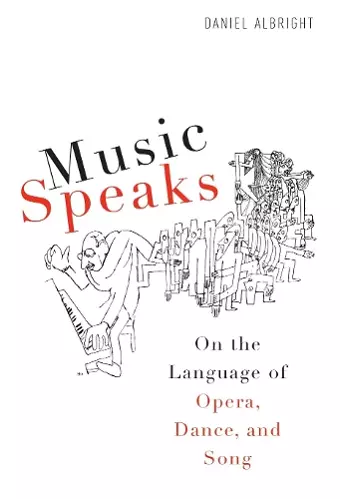Music Speaks
On the Language of Opera, Dance, and Song
Format:Hardback
Publisher:Boydell & Brewer Ltd
Published:1st Nov '09
Should be back in stock very soon

Explores the meaning[s] of music, the most intricate and significant language invented by our culture. From Daniel Albright, author of Musicking Shakespeare and Berlioz's Semi-Operas, comes a collection of essays on music and on dance, probing the problems of articulating the meaning[s] of music; the larger question of how music and language interact; how text-setting highlights certain areas of meter, theme, or ironic undertone, and leaves others in darkness; how a musical composition can behave as a critique of a previous composition; and how one might rehabilitate certain underappreciated or much-scorned figures, such as Meyerbeer, by showing that the very terms of invective used against them can be seen, from another angle, as an indication of what is exciting in their work. Albright shows that music history has an aesthetic of its own, and how music history interacts with intellectual history (from Rousseau to Paul de Man). By abutting music against literature and painting, and by juxtaposing the musics of different centuries, Albright frames a particular work, isolating what is arresting and important in it. The essays range widely, but they rarely stray far from opera, for the opera house is the venue where the performances speak the most intricate and significant language invented by our culture -- a language that speaks in music, words, pictures, and light. Daniel Albright teaches courses in the English, ComparativeLiterature, and Music departments at Harvard University.
The key phrase comes toward the end of this zestful and stimulating collection: 'I think of music, of all music, as a teasing of the linguistic areas of the brain.' Much of Albright's writing springs from, around, out of, into, behind, and beyond this beautiful and illuminating thought, which he carries with him through encounters with works by Berlioz, Wagner, Schoenberg, Stravinsky, Carter, and others. And 'teasing' -- in the senses of gently mocking, of pulling out, and indeed of titillating -- is also his modus operandi. -- -- Paul Griffiths, noted music critic, author of The Sea on Fire: Jean Barraqué and The Substance of Things Heard: Writings about Music University of Rochester Press
Criticism so relentlessly intelligent is rarely so buoyant, so ready to charm while it challenges. In staging this genial confabulation between the music of language and the language of music, Daniel Albright once again matches childlike openness with seasoned irony, humor with highmindedness, experience with poetry. -- -- Scott Burnham, Professor of Music, Princeton University, and author of Beethoven Hero .
The insights Albright offers are inextricable from the striking language in which they are expressed. . . . The swerves away from one intriguing example and towards the next are so breathtaking -- and often so beautifully executed -- that it is precisely the line of argument that catches the imagination. . . . The writing is so sparkling that you find yourself wondering whether Albright really talks like this [I hope he does]. . . . Expresses compellingly the irreducible singularity of points of conact between music and language. -- Cormac Newark * MUSIC AND LETTERS *
ISBN: 9781580463249
Dimensions: unknown
Weight: 540g
248 pages